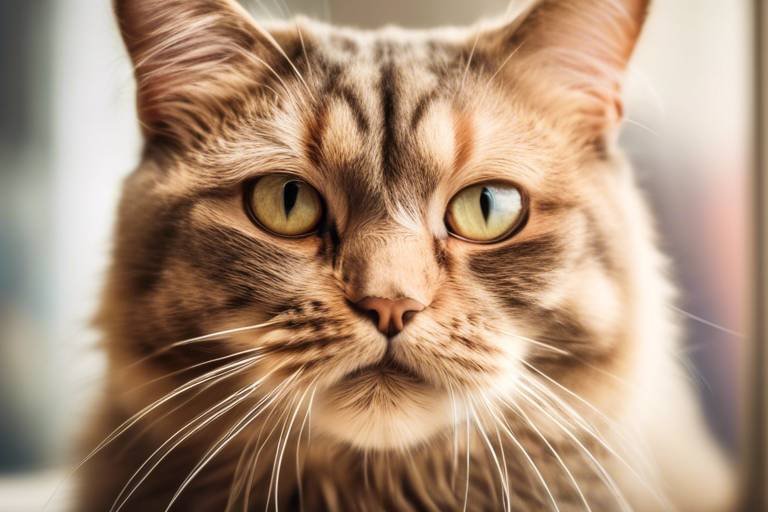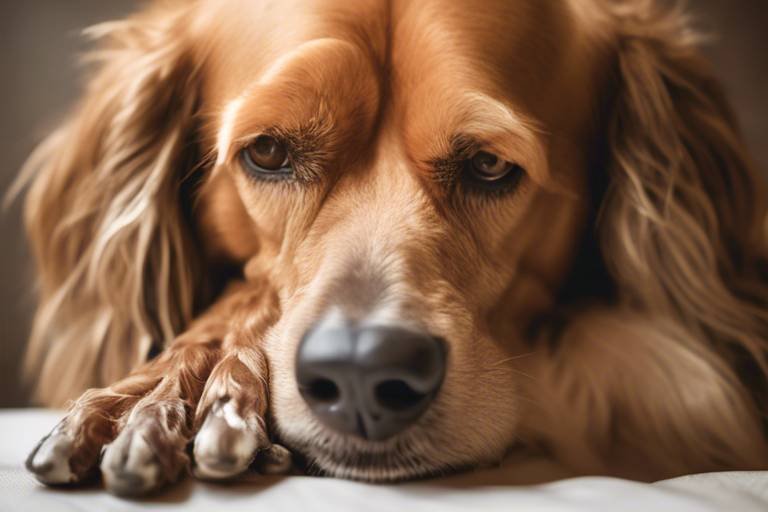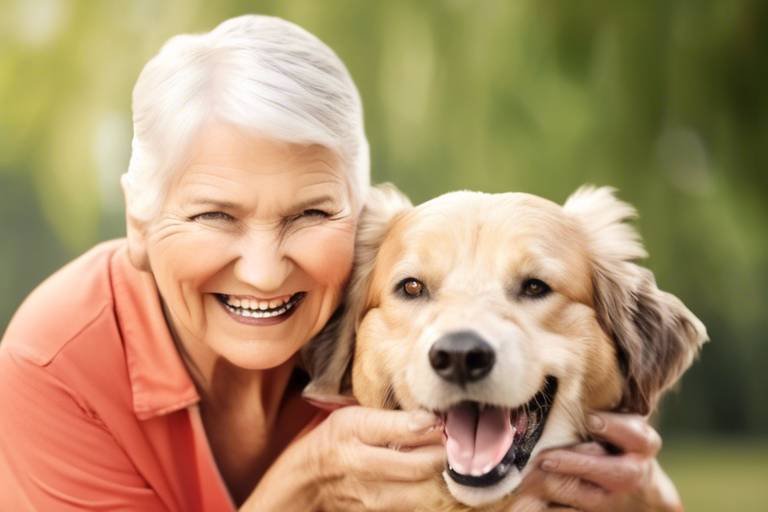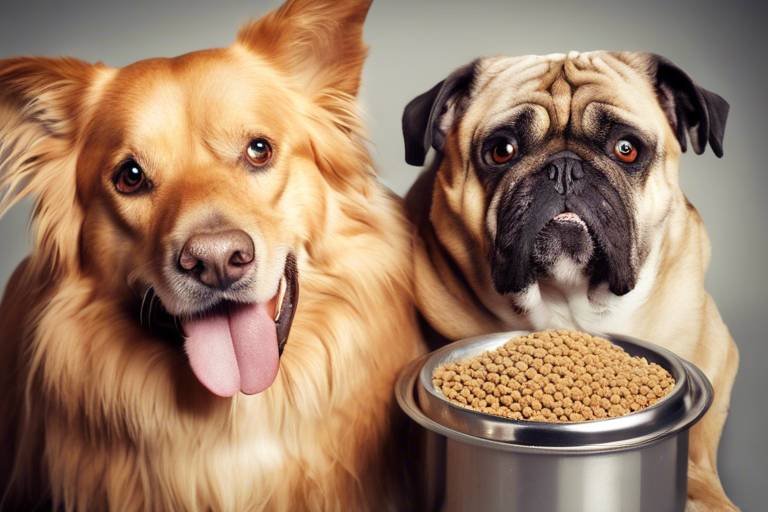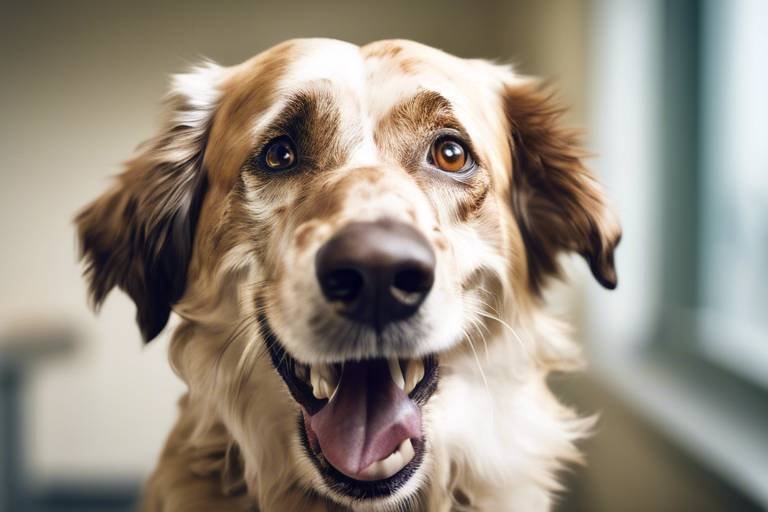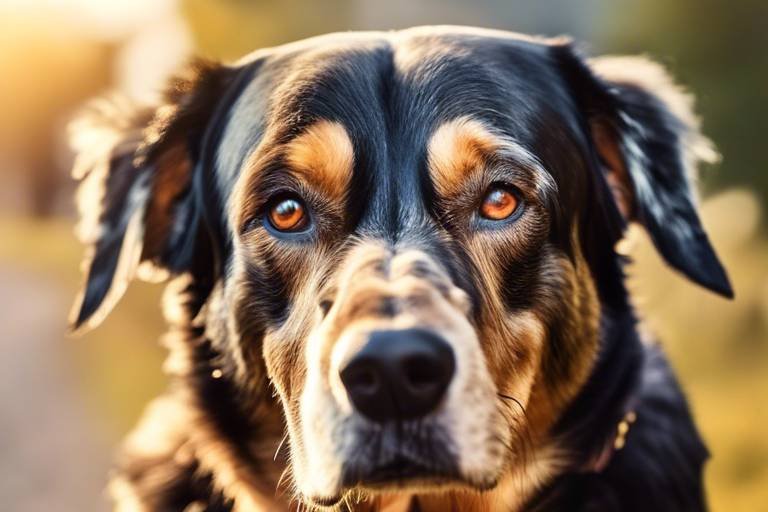The Best Health Checks for Senior Pets
As our beloved furry friends age, they deserve the utmost attention and care to ensure their golden years are filled with happiness and health. Senior pets require specialized health checks to monitor their well-being and catch any potential issues before they escalate. Just like we humans need regular check-ups, our pets benefit immensely from routine veterinary visits. These visits can be the difference between a happy pet and one that is suffering in silence. Imagine your pet as a fine wine; with age, they can become more refined, but they also need the right conditions to thrive. So, let’s dive into the essential health checks that will keep your senior pets in tip-top shape!
Regular veterinary visits are crucial for diagnosing health issues early in senior pets. Think of these visits as a safety net; they help monitor your pet's overall health and can lead to timely interventions that improve their well-being. During these check-ups, vets can perform a variety of tests and assessments, including blood work, urine analysis, and physical exams, all designed to catch potential problems before they become serious. By keeping a close watch on your pet's health, you can ensure that they receive the necessary treatments and adjustments to their care as they age.
As pets age, they become susceptible to various health problems. Understanding these common issues can help owners recognize symptoms early and seek appropriate veterinary care to manage their pets' health effectively. Conditions such as arthritis, diabetes, kidney disease, and heart problems can become more prevalent in older pets. This is why being proactive and observant is key. Just like a detective piecing together clues, you must be vigilant about changes in your pet's behavior or routine. For instance, if your once-active dog suddenly prefers to lounge around, it may be time for a check-up. Early detection can often lead to better outcomes and a happier, healthier pet.
Dental disease is prevalent in senior pets, often leading to pain and other health complications. Just as we prioritize our dental health, it’s essential to maintain your pet's oral hygiene. Regular dental check-ups and cleanings are essential to maintain their oral health and overall well-being. Neglecting dental care can lead to serious issues, including infections that can affect other organs, such as the heart and kidneys. So, don’t let your pet suffer in silence—make dental health a priority!
Pet owners should be aware of signs indicating dental issues, such as bad breath, difficulty eating, or swollen gums. These symptoms can be subtle at first, but they can escalate quickly. Early detection can prevent more serious health problems down the line. If you notice your pet showing any of these signs, it’s crucial to schedule a veterinary visit as soon as possible.
Implementing routine dental care at home, such as brushing and dental treats, can significantly enhance your senior pet's oral health. Regular vet assessments will complement these efforts. Consider using pet-safe toothpaste and brushes designed specifically for animals. Additionally, incorporating dental chews into their diet can help reduce plaque and tartar buildup, making those tail wags even more delightful!
Maintaining a healthy weight is vital for senior pets, as obesity can lead to numerous health complications. Just like humans, pets can struggle with weight gain as they age, which can lead to issues like diabetes, joint problems, and heart disease. Learning effective weight management strategies can help ensure your pet remains fit and active. This includes providing a balanced diet, controlling portion sizes, and encouraging regular exercise. Think of it as a team effort—you and your pet working together to stay healthy!
Keeping vaccinations up to date is essential for senior pets to protect them from preventable diseases. Regular preventive care can significantly enhance their quality of life and longevity. Vaccines can help your pet fend off illnesses that could otherwise be debilitating. Just like a shield protects a knight, vaccinations act as a barrier against harmful diseases. Make sure to consult your vet about which vaccines are necessary for your senior pet.
Senior pets are often more vulnerable to parasites. Implementing a robust parasite control program is necessary to safeguard their health and prevent infestations that can lead to serious illness. Fleas, ticks, and worms can wreak havoc on your pet's health, especially as their immune systems weaken with age. Regular treatments and checks can keep these pesky invaders at bay, allowing your pet to enjoy their golden years without the discomfort of parasites.
As pets age, their nutritional needs change. Adjusting their diet to include senior-specific food can help address these needs and support their health throughout their golden years. Senior pet foods are often formulated with fewer calories and added nutrients that support joint health, cognitive function, and overall vitality. Think of it as a tailored suit—your pet deserves a diet that fits them perfectly!
- How often should I take my senior pet to the vet? It’s recommended to visit the vet at least twice a year for check-ups.
- What are the signs my pet is aging? Look for changes in behavior, mobility, and appetite, as well as dental health issues.
- Can I give my senior pet human food? Some human foods are safe, but always consult your vet before making any changes to their diet.
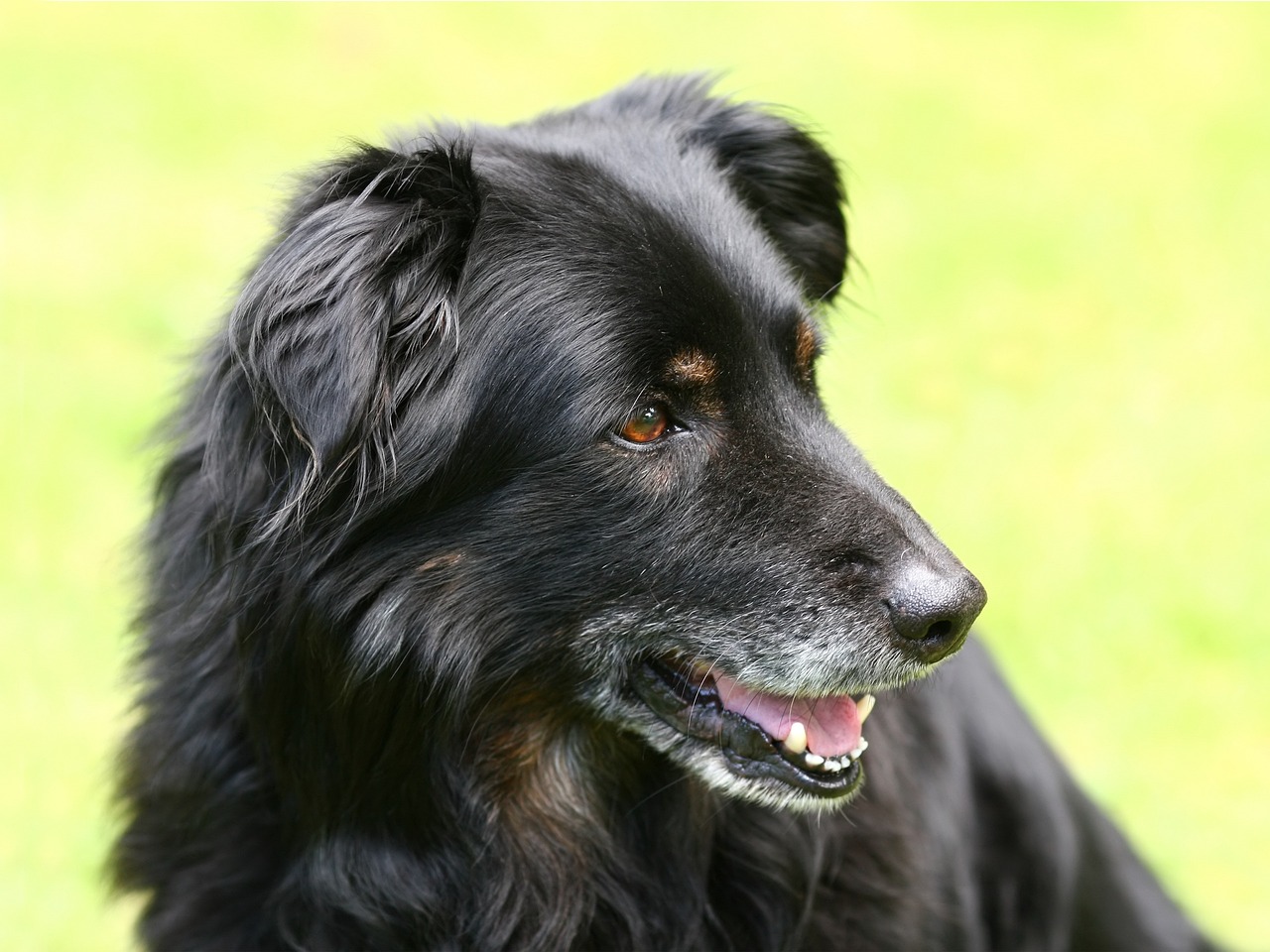
Importance of Regular Vet Visits
This article explores essential health checks for senior pets, ensuring they receive the best care possible. We will cover various aspects of health monitoring and preventive measures to enhance their quality of life.
When it comes to our furry companions, especially as they grow older, regular veterinary visits are not just a good idea; they are absolutely crucial! Imagine your pet as a fine wine that gets better with age, but also requires careful storage and attention to maintain its quality. Just like that, senior pets need consistent check-ups to catch any potential health issues before they escalate into something serious. These visits are vital for diagnosing health problems early, allowing for timely interventions that can significantly improve your pet's quality of life.
During these visits, your veterinarian will perform a comprehensive health evaluation. This typically includes:
- Physical Examination: A thorough check-up to assess your pet's overall health, including weight, coat condition, and mobility.
- Blood Tests: Routine bloodwork can help detect underlying issues such as kidney function or diabetes that might not be evident through physical exams alone.
- Vaccination Updates: Keeping your pet's vaccinations current is essential to protect them from preventable diseases, which can be more severe in older animals.
Moreover, regular vet visits allow for the monitoring of any chronic conditions your pet may have, such as arthritis or heart disease. Think of it as a maintenance check for a car—if you ignore the warning signs, you might find yourself stranded on the side of the road. By staying ahead of potential issues, you can ensure your pet remains as healthy and happy as possible.
In addition to physical health, these visits also provide an opportunity for pet owners to discuss behavioral changes that might indicate underlying health problems. For instance, if your senior cat suddenly becomes more withdrawn or your dog starts showing signs of anxiety, these could be red flags that warrant further investigation. Your veterinarian can offer insights and solutions tailored to your pet's specific needs.
In conclusion, making regular vet visits a priority is one of the best things you can do for your senior pet. Not only does it help catch potential health issues early, but it also strengthens the bond between you and your furry friend. After all, a healthy pet is a happy pet, and who wouldn’t want that?
As pets age, they become susceptible to various health problems. Understanding these common issues can help owners recognize symptoms early and seek appropriate veterinary care to manage their pets' health effectively.
Dental disease is prevalent in senior pets, often leading to pain and other health complications. Regular dental check-ups and cleanings are essential to maintain their oral health and overall well-being.
Pet owners should be aware of signs indicating dental issues, such as bad breath, difficulty eating, or swollen gums. Early detection can prevent more serious health problems down the line.
Implementing routine dental care at home, such as brushing and dental treats, can significantly enhance your senior pet's oral health. Regular vet assessments will complement these efforts.
Maintaining a healthy weight is vital for senior pets, as obesity can lead to numerous health complications. Learning effective weight management strategies can help ensure your pet remains fit and active.
Keeping vaccinations up to date is essential for senior pets to protect them from preventable diseases. Regular preventive care can significantly enhance their quality of life and longevity.
Senior pets are often more vulnerable to parasites. Implementing a robust parasite control program is necessary to safeguard their health and prevent infestations that can lead to serious illness.
As pets age, their nutritional needs change. Adjusting their diet to include senior-specific food can help address these needs and support their health throughout their golden years.
Q: How often should I take my senior pet to the vet?
A: It’s generally recommended to take senior pets to the vet at least twice a year for check-ups. However, if your pet has existing health conditions, more frequent visits may be necessary.
Q: What signs should I look for that indicate my senior pet needs to see a vet?
A: Look for changes in behavior, appetite, weight, or mobility. Signs such as excessive thirst, lethargy, or difficulty getting up can indicate health issues.
Q: Are there specific vaccinations needed for senior pets?
A: Yes, senior pets may need different vaccinations or boosters based on their health status and lifestyle. Consult your veterinarian for a tailored vaccination schedule.

Common Health Issues in Senior Pets
As our beloved furry friends age, they often face a myriad of health challenges that can significantly affect their quality of life. Understanding these common health issues is crucial for pet owners, as it enables them to recognize symptoms early and seek appropriate veterinary care. Just like us, pets undergo changes in their bodies as they grow older, making them susceptible to a variety of ailments. Here are some of the most prevalent health issues that senior pets may encounter:
- Arthritis: One of the most common issues in older pets is arthritis, a painful condition that affects their joints. It can lead to decreased mobility, making it difficult for them to jump, run, or even walk comfortably.
- Kidney Disease: Senior pets are at a higher risk for kidney disease, which can be life-threatening if not detected early. Symptoms may include increased thirst, frequent urination, and weight loss.
- Heart Disease: As pets age, their cardiovascular system may weaken. Heart disease can manifest in various ways, including coughing, fatigue, and difficulty breathing.
- Diabetes: Just like humans, pets can develop diabetes, especially as they become older. Symptoms to watch for include excessive thirst, frequent urination, and unexplained weight loss.
- Cognitive Dysfunction: Many senior pets experience cognitive dysfunction syndrome, akin to dementia in humans. This can lead to confusion, disrupted sleep patterns, and changes in behavior.
Recognizing these issues early can make a world of difference in managing your pet's health. Regular veterinary check-ups become increasingly important as your pet ages, allowing for early detection and intervention. For instance, if you notice your pet is less active or seems to be in pain, it’s essential to consult your vet. They can perform diagnostic tests to determine the underlying causes and recommend appropriate treatments.
Additionally, it’s vital to be observant of any behavioral changes in your senior pet. For example, if your once-playful dog suddenly prefers to lie down all day, or if your cat is avoiding their litter box, these could be signs of underlying health issues. Keeping a close eye on their behavior can help you catch problems before they escalate.
Moreover, don't underestimate the importance of a balanced diet tailored to your pet's age and health condition. Senior pets may require different nutrients compared to their younger counterparts. A diet rich in antioxidants, omega fatty acids, and low in calories can help maintain their overall health and energy levels.
In conclusion, while aging can bring about several health challenges for our pets, being informed and proactive can significantly improve their quality of life. Regular vet visits, a keen eye for changes in behavior, and proper nutrition are key components in managing your senior pet's health effectively. Remember, your furry friend relies on you to advocate for their well-being, so stay vigilant and loving!
Dental Health Considerations
When it comes to our beloved senior pets, dental health is often an overlooked aspect of their overall well-being. Just like humans, pets can suffer from a range of dental issues as they age, which can lead to discomfort, pain, and even more serious health complications. Did you know that nearly 80% of dogs and 70% of cats show signs of dental disease by the age of three? That’s a staggering statistic that highlights the importance of maintaining good oral hygiene. Regular dental check-ups are crucial because they not only help in identifying problems early but also in preventing them from escalating into severe health issues.
One of the most common dental problems in senior pets is periodontal disease. This condition arises when plaque builds up on the teeth, leading to gum inflammation and infection. If left untreated, it can result in tooth loss and may even allow bacteria to enter the bloodstream, affecting vital organs such as the heart and kidneys. The best way to combat this is through routine veterinary dental cleanings, which can help remove tartar and plaque that brushing at home might miss.
Moreover, regular dental care at home can significantly contribute to your pet's oral health. Here are some effective strategies:
- Brushing: Aim to brush your pet's teeth several times a week. Use toothpaste specifically designed for pets, as human toothpaste can be harmful to them.
- Dental Treats: Incorporating dental chews or treats into your pet's diet can help reduce plaque and tartar buildup.
- Water Additives: Consider using pet-safe water additives that can help freshen breath and reduce plaque.
Being proactive about your senior pet's dental health can lead to a happier and healthier life. Regular veterinary assessments will complement your at-home care efforts, ensuring that any potential issues are caught early. Remember, prevention is always better than cure, especially when it comes to the health of our furry friends. So, make that appointment for a dental check-up today; your pet will thank you for it!
Q1: How often should I take my senior pet for dental check-ups?
A: It's recommended to schedule dental check-ups at least once a year for senior pets, but consult your veterinarian for personalized advice based on your pet's specific needs.
Q2: What are the signs of dental disease in pets?
A: Common signs include bad breath, difficulty eating, swollen or bleeding gums, and excessive drooling. If you notice any of these symptoms, it's time for a vet visit.
Q3: Can I use human toothpaste for my pet?
A: No, human toothpaste contains ingredients that can be harmful to pets. Always use toothpaste specifically formulated for dogs or cats.
Signs of Dental Problems
This article explores essential health checks for senior pets, ensuring they receive the best care possible. We will cover various aspects of health monitoring and preventive measures to enhance their quality of life.
Regular veterinary visits are crucial for diagnosing health issues early in senior pets. These check-ups help monitor their overall health and can lead to timely interventions that improve their well-being.
As pets age, they become susceptible to various health problems. Understanding these common issues can help owners recognize symptoms early and seek appropriate veterinary care to manage their pets' health effectively.
Dental disease is prevalent in senior pets, often leading to pain and other health complications. Regular dental check-ups and cleanings are essential to maintain their oral health and overall well-being.
As a loving pet owner, it's vital to be vigilant about your senior pet's dental health. Many signs can indicate potential dental problems, and recognizing them early can make a significant difference in their quality of life. Here are some common symptoms to watch out for:
- Bad Breath: While some odor is normal, an unusually foul smell can indicate dental disease.
- Difficulty Eating: If your pet is hesitating to eat or seems to be chewing on one side, it may be due to pain or discomfort.
- Swollen Gums: Red or swollen gums can be a clear sign of periodontal disease.
- Excessive Drooling: Increased drooling can occur when pets are in pain or have dental issues.
- Changes in Behavior: If your pet seems irritable or withdrawn, it could be due to dental discomfort.
Understanding these signs is essential, as early detection can prevent more serious health problems down the line. For example, untreated dental disease can lead to infections that may affect your pet's heart, liver, or kidneys. Therefore, keeping an eye on their oral health can save you from heartache and hefty vet bills later.
Implementing routine dental care at home, such as brushing and dental treats, can significantly enhance your senior pet's oral health. Regular vet assessments will complement these efforts.
Maintaining a healthy weight is vital for senior pets, as obesity can lead to numerous health complications. Learning effective weight management strategies can help ensure your pet remains fit and active.
Keeping vaccinations up to date is essential for senior pets to protect them from preventable diseases. Regular preventive care can significantly enhance their quality of life and longevity.
Senior pets are often more vulnerable to parasites. Implementing a robust parasite control program is necessary to safeguard their health and prevent infestations that can lead to serious illness.
As pets age, their nutritional needs change. Adjusting their diet to include senior-specific food can help address these needs and support their health throughout their golden years.
Q: How often should I take my senior pet to the vet?
A: Ideally, senior pets should have a veterinary check-up at least twice a year. This frequency allows for early detection of any health issues.
Q: What are the signs that my pet needs dental care?
A: Signs include bad breath, difficulty eating, swollen gums, excessive drooling, and changes in behavior. If you notice any of these, consult your vet.
Q: Can I brush my senior pet's teeth at home?
A: Yes! Brushing your pet's teeth at home is highly encouraged. Use a toothbrush and toothpaste specifically designed for pets.
Q: What should I feed my senior pet?
A: Look for high-quality, senior-specific pet food that meets their nutritional needs. Always consult your vet for personalized recommendations.
Dental Care Tips
Maintaining your senior pet's dental health is crucial, and it’s not as daunting as it may seem! Think of dental care like a daily ritual, much like brushing your own teeth. Just as we prioritize our oral hygiene, our furry friends deserve the same attention. Here are some effective tips to keep their smiles bright and healthy:
First and foremost, brushing your pet's teeth is the gold standard in dental care. It may take some time for your pet to get used to it, but starting slowly can make the process easier. Use a toothbrush designed for pets and a toothpaste specifically formulated for them—never use human toothpaste, as it can be harmful. Aim to brush their teeth at least two to three times a week. If daily brushing is possible, that’s even better!
Additionally, consider incorporating dental treats and toys into their routine. These products are designed to promote chewing, which naturally helps reduce plaque and tartar buildup. Look for treats that have the Veterinary Oral Health Council (VOHC) seal of approval, as they have been shown to be effective in maintaining oral health. Remember, these treats should complement, not replace, regular brushing.
Another essential aspect of dental care is regular veterinary check-ups. During these visits, your vet can perform professional cleanings and check for any underlying dental issues. It’s a good idea to schedule these cleanings at least once a year, but your vet may recommend more frequent visits depending on your pet's specific needs. Just like us, pets can develop dental disease without any visible signs, so proactive care is key!
Lastly, keep an eye out for signs of dental problems. If you notice your pet exhibiting any unusual behaviors, such as reluctance to eat, excessive drooling, or bad breath, it’s time to consult your veterinarian. Early detection can save your pet from unnecessary pain and complications.
In conclusion, maintaining your senior pet's dental health is an ongoing commitment that pays off in the long run. By incorporating these simple yet effective dental care tips into your routine, you’ll not only enhance your pet’s quality of life but also ensure that their golden years are filled with healthy, happy smiles!
Q: How often should I brush my senior pet's teeth?
A: Ideally, you should brush your senior pet's teeth at least two to three times a week. Daily brushing is even better if your pet tolerates it.
Q: What are the signs of dental disease in pets?
A: Common signs include bad breath, difficulty eating, swollen or bleeding gums, and excessive drooling. If you notice any of these symptoms, consult your veterinarian.
Q: Are dental treats effective?
A: Yes, dental treats can be effective in reducing plaque and tartar buildup, especially if they carry the VOHC seal of approval. However, they should not replace regular brushing.
Q: How often should my senior pet have professional dental cleanings?
A: Most senior pets should have professional dental cleanings at least once a year, but your veterinarian may recommend more frequent visits based on your pet's dental health.
Weight Management Strategies
Maintaining a healthy weight is crucial for senior pets, as obesity can lead to a myriad of health complications, including diabetes, joint issues, and heart disease. As our furry friends age, their metabolism slows down, and their activity levels often decrease, making it essential to adopt effective weight management strategies. So, how can you ensure your pet stays fit and active? Let’s dive into some practical approaches!
First and foremost, portion control is key. Many pet owners unknowingly overfeed their pets, which can lead to weight gain. It’s important to measure your pet’s food and adhere to the feeding guidelines provided by your veterinarian or the pet food manufacturer. This helps to prevent overindulgence. Remember, just because they give you those adorable puppy-dog eyes doesn’t mean they need an extra treat!
In addition to portion control, consider switching to senior-specific pet food. These formulations are designed to meet the unique nutritional needs of older pets, often containing fewer calories and higher fiber content, which helps them feel full without adding extra pounds. Look for foods that list high-quality protein sources and essential nutrients to support their overall health.
Exercise is another vital component of weight management. While senior pets may not be able to run as fast or play as intensely as they did in their youth, regular, gentle exercise remains essential. Activities like short walks, light play sessions, or even swimming can keep them active without putting too much strain on their joints. Aim for at least 20-30 minutes of activity a day, but always consult your veterinarian to tailor an exercise plan suited to your pet’s abilities.
To further assist in managing your pet’s weight, consider creating a weight loss plan in collaboration with your veterinarian. This plan may include regular weigh-ins to monitor progress and adjustments to diet and exercise as needed. Keeping track of your pet’s weight can be as simple as using a calendar or a dedicated app, allowing you to celebrate small victories along the way!
It's also beneficial to incorporate mental stimulation into your pet's routine. Engaging their minds can help reduce boredom and prevent them from seeking out food as entertainment. Puzzle toys, treat-dispensing balls, or even teaching new tricks can keep their brains active and make exercise more enjoyable.
Lastly, remember that patience and consistency are essential in any weight management strategy. Weight loss in pets can take time, and it’s important to stay committed to the plan. Celebrate their progress, no matter how small, and always provide plenty of love and encouragement. After all, a happy pet is a healthy pet!
- How often should I weigh my senior pet? It's recommended to weigh your senior pet at least once a month to monitor any changes in weight.
- Can I give my senior pet treats? Yes, but be mindful of the caloric content and try to opt for healthy, low-calorie treats.
- What type of exercise is best for senior pets? Gentle activities like walking, swimming, or short play sessions are ideal for keeping them active without overexertion.
- Should I consult my vet before changing my pet's diet? Absolutely! Your vet can provide tailored advice based on your pet’s specific health needs.
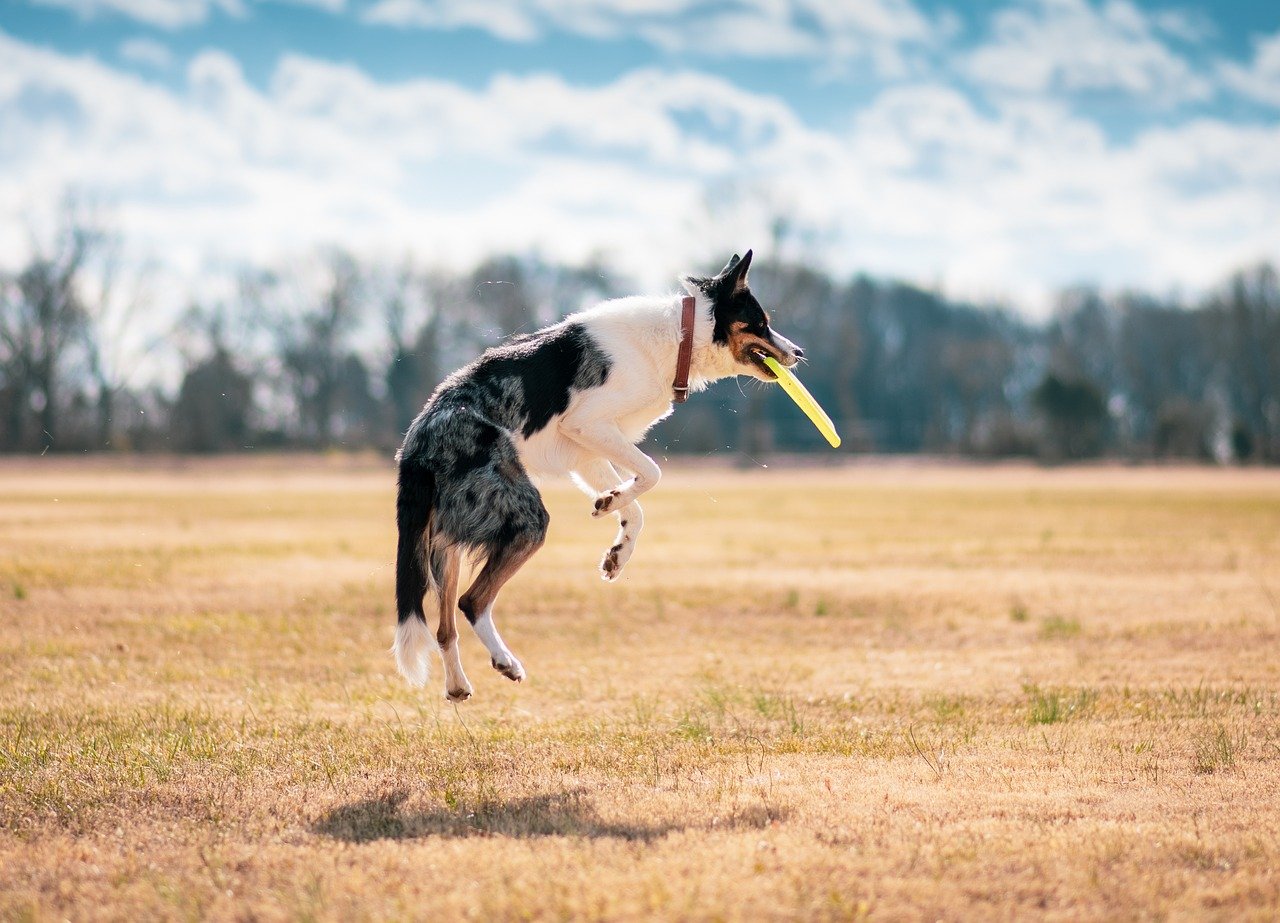
Vaccination and Preventive Care
When it comes to our beloved senior pets, ensuring they receive the right vaccinations and preventive care is paramount. Just like us, as pets age, their immune systems can weaken, making them more susceptible to diseases that could have been easily avoided with timely vaccinations. Regular check-ups with your veterinarian can help determine which vaccines are necessary based on your pet's age, health status, and lifestyle. This proactive approach not only safeguards their health but also enhances their overall quality of life.
It's essential to stay up to date with vaccinations, as they play a crucial role in preventing diseases such as parvovirus, distemper, and rabies. These diseases can pose serious threats, especially to older pets whose bodies may not respond as robustly to infections. Moreover, preventive care extends beyond just vaccinations; it includes regular screenings for conditions like heartworm and Lyme disease, which can lead to severe complications if left unchecked.
In addition to vaccinations, preventive care encompasses various aspects of your pet's health. Regular blood tests can help catch underlying health issues early, such as kidney disease or diabetes, which are common in senior pets. Furthermore, dental cleanings and routine examinations can prevent oral diseases that could affect their overall health. Consider the following key components of preventive care:
- Routine Vet Visits: Schedule at least bi-annual check-ups to monitor your pet’s health.
- Vaccination Updates: Ensure your pet is up to date on vaccinations, especially for rabies and other core vaccines.
- Parasite Prevention: Implement a year-round parasite control plan to protect against fleas, ticks, and heartworms.
By taking these steps, you can help prevent serious health issues and ensure your pet enjoys their golden years with vitality. Remember, prevention is always better than cure, and investing in your pet's health today can lead to a longer, happier life tomorrow.
Q: How often should my senior pet see the veterinarian?
A: Senior pets should ideally have a veterinary check-up every six months to monitor their health closely.
Q: Are there any specific vaccinations that senior pets need?
A: Yes, senior pets may need certain vaccinations updated based on their health status and lifestyle. Consult your veterinarian for tailored advice.
Q: What preventive measures can I take to ensure my senior pet stays healthy?
A: Regular vet visits, vaccinations, parasite control, and a balanced diet are all crucial preventive measures for senior pets.
Q: How can I tell if my pet is due for vaccinations?
A: Keep track of your pet's vaccination history and schedule reminders for when they are due. Your veterinarian can also provide guidance.
Parasite Control
When it comes to our beloved senior pets, is a crucial aspect of their health care that often gets overlooked. As our furry friends age, their immune systems may weaken, making them more vulnerable to parasites such as fleas, ticks, and worms. These pesky invaders not only cause discomfort but can also lead to serious health issues if left unchecked. Therefore, implementing a comprehensive parasite control program is essential for safeguarding your pet's health and ensuring they enjoy their golden years to the fullest.
One of the best ways to start is by scheduling regular veterinary check-ups. Your vet can recommend appropriate parasite prevention products tailored to your pet's specific needs. These products can range from topical treatments to oral medications, and they play a vital role in keeping parasites at bay. It's important to remember that prevention is always better than cure; dealing with an infestation can be quite stressful for both you and your pet.
In addition to veterinary care, there are several steps you can take at home to minimize the risk of parasite infestations:
- Regular Grooming: Frequent brushing and bathing can help remove any potential parasites and their eggs from your pet's coat.
- Clean Living Environment: Regularly clean your pet's bedding and living areas to eliminate any hidden parasites.
- Yard Maintenance: Keep your yard tidy by mowing the lawn and removing any debris where parasites may thrive.
Moreover, it's essential to be aware of the signs of a parasite problem. Common symptoms may include excessive scratching, biting at the skin, weight loss, or a dull coat. If you notice any of these signs, consult your veterinarian immediately. Early detection can lead to prompt treatment and a quicker recovery for your furry friend.
To summarize, a proactive approach to parasite control not only protects your senior pet from discomfort but also enhances their overall quality of life. By staying vigilant and working closely with your veterinarian, you can help ensure that your pet remains happy, healthy, and free from pesky parasites.
Q: How often should I treat my senior pet for parasites?
A: It's generally recommended to treat your senior pet for parasites monthly, but it's best to consult your veterinarian for a personalized schedule based on your pet's lifestyle and health.
Q: Are there any side effects of parasite control medications?
A: While most parasite control medications are safe, some pets may experience mild side effects. Always monitor your pet after administering a new medication and consult your vet if you notice anything unusual.
Q: Can indoor pets get parasites?
A: Yes, indoor pets can still be at risk for parasites. Fleas and ticks can be brought inside on clothing or other pets, so it's important to maintain a parasite control regimen even for indoor pets.
Q: What should I do if I suspect my pet has parasites?
A: If you suspect your pet has parasites, contact your veterinarian as soon as possible for a thorough examination and appropriate treatment.
Nutrition and Diet Adjustments
As our furry companions age, their nutritional needs undergo significant changes, much like how we might crave different foods as we grow older. It's essential to recognize that what worked for your pet in their younger years might not be suitable for them now. Senior pets often require a diet tailored specifically to their age group, which can help maintain their health and vitality during their golden years.
One of the most critical adjustments involves the balance of nutrients in their diet. Senior pets may need fewer calories due to reduced activity levels, but they still require high-quality protein to support muscle maintenance and overall health. Incorporating senior-specific food can provide the right balance of nutrients, ensuring your pet receives essential vitamins and minerals without unnecessary fillers. Look for foods that contain:
- High-quality protein sources like chicken, fish, or lamb.
- Omega-3 fatty acids to support joint health and reduce inflammation.
- Fiber to aid digestion and maintain a healthy weight.
- Antioxidants to boost their immune system.
Moreover, hydration is paramount. Older pets may not drink as much water as they should, which can lead to dehydration. Consider adding wet food to their diet or providing fresh water frequently to encourage them to stay hydrated. Just like us, pets can suffer from kidney issues and other ailments exacerbated by inadequate water intake.
It's also important to monitor your pet's weight closely. If you notice any significant changes, it might be time to reevaluate their diet. Weight management is crucial for senior pets, as obesity can lead to various health complications, including diabetes and joint problems. Regular vet check-ups can help you determine if your pet is maintaining a healthy weight.
Lastly, don't forget about the power of treats! While it's tempting to spoil your pet with goodies, opt for healthy treats that align with their dietary needs. Look for treats that are low in calories but high in nutritional value. You can even make homemade treats using senior-friendly ingredients, ensuring they're both delicious and beneficial for your furry friend.
In summary, adjusting your senior pet's diet is a vital step in ensuring they live a long, healthy, and happy life. By providing them with the right nutrition tailored to their needs, you're not just feeding them; you're investing in their overall well-being and happiness.
Q: How can I tell if my senior pet needs a diet change?
A: Look for signs such as weight gain or loss, changes in energy levels, or digestive issues. Regular vet visits can also help identify if a diet change is necessary.
Q: Are there specific brands of food recommended for senior pets?
A: Many reputable brands offer senior-specific formulas. It's best to consult with your veterinarian for personalized recommendations based on your pet's health needs.
Q: Can I continue feeding my senior pet the same food as before?
A: While some pets may tolerate their regular food, it's advisable to transition to a senior-specific diet to meet their changing nutritional needs.
Q: How often should I feed my senior pet?
A: Many senior pets benefit from smaller, more frequent meals rather than one or two large meals. This can aid digestion and help maintain a healthy weight.
Frequently Asked Questions
- What are the signs that my senior pet needs a vet visit?
If your senior pet is showing signs like lethargy, changes in appetite, difficulty standing or walking, or unusual behavior, it's time to schedule a vet visit. Regular health checks can catch problems early, so don’t hesitate!
- How often should I take my senior pet to the vet?
For senior pets, it's generally recommended to visit the vet at least twice a year. This allows for thorough health monitoring and timely interventions, ensuring your furry friend stays healthy and happy!
- What common health issues should I watch for in senior pets?
As pets age, they can face a variety of issues, including arthritis, dental disease, obesity, and kidney problems. Being aware of these can help you spot symptoms early and seek necessary care.
- How can I maintain my senior pet's dental health?
Regular dental check-ups are essential. At home, you can brush their teeth, provide dental treats, and monitor for signs like bad breath or difficulty eating. Keeping their teeth clean is crucial for overall health!
- What should I do if my senior pet is overweight?
Start by consulting your vet for a tailored weight management plan. This may include diet adjustments and increased exercise to help your pet shed those extra pounds safely.
- Are vaccinations still necessary for senior pets?
Absolutely! Keeping vaccinations up to date is vital for protecting your senior pet from preventable diseases. Regular vet visits will help ensure they receive the necessary vaccines.
- How can I adjust my pet’s diet as they age?
As pets grow older, their nutritional needs change. Look for senior-specific food that meets these needs, focusing on quality ingredients to support their health and energy levels.
- What parasite control measures should I take for my senior pet?
Senior pets are more vulnerable to parasites, so it's essential to have a robust parasite control program in place. Regular vet check-ups will help you stay on top of this important aspect of their health.



